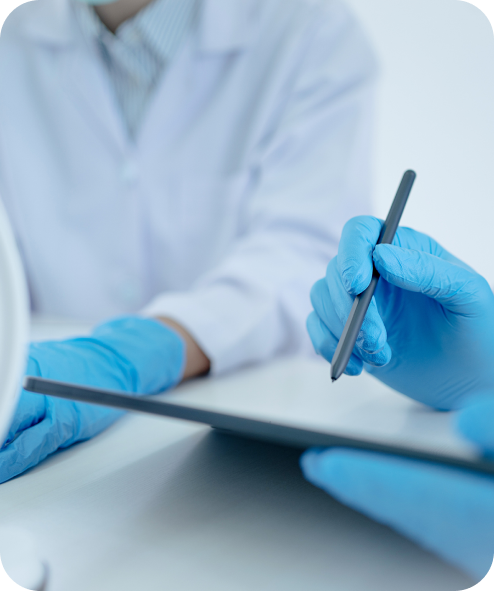Non-invasive PGT or ni-PGT:
preimplantation genetic diagnosis without biopsy
What is it?
Embryo genetic diagnosis, also known as PGT, is an assisted reproduction technique that enables us to study an embryo’s DNA in order to select those carrying the required genetic load. To undertake this study, some of the embryo’s cells obtained through a biopsy are analysed.
This test is only suitable in those cases in which there is a strong suspicion of genetic pathology in the embryos, such as in the case of patients with an advanced maternal age or suffering from recurrent miscarriages. Its results provide very reliable data that allow us to make an accurate genetic diagnosis, in order to transfer those embryos with the correct number of chromosomes to the mother’s uterus. You can find more information here.
PGT can also be used to diagnose genetic diseases that may be carried by the parents, and to prevent them from being passed on to the offspring. In these cases, patients undergo a consultation at Eugin’s Reproductive Genetics Unit, where all the necessary information is gathered in order to carry out genetic counselling and assess the different reproductive and treatment options available in order to minimise any risks to the offspring.
Thanks to advances in reproductive medicine, a few months ago Eugin implemented a new laboratory technique known as niPGT-A, which is a non-invasive embryo genetic screening. This test makes it possible to obtain genetic information about the embryo from the traces of embryonic DNA present in the culture medium where it develops. This avoids the need to biopsy the embryo, thereby eliminating the risks associated with this technique. NiPGT-A represents an important difference with respect to traditional PGT-A: it is not a diagnostic tool, but a pre-implantation genetic screening. Therefore, it does not replace PGT-A when prescribed by a specialist, but it does provide important information to make decisions alongside patients.


Advantages of using the non-invasive PGT technique or ni-PGT
The PGT-A or niPGT-A techniques share a very similar laboratory process for analysing embryonic DNA. What differentiates them is the place from which the sample is extracted to perform the assessment and the type of result: in the former, the analysis is performed on the cells of the outermost layer of the embryo, and the result provides a diagnosis; while in the latter, the test is carried out on the medium in which the embryo is cultured between days 4 and 6, which contains its DNA, and the results obtained provide screening data.
In this regard, experts point out the advantages of the niPGT-A, namely, the fact that it is not necessary to interfere with the embryo itself, as it is a non-invasive PGT, since no biopsy is performed on the embryo. On the other hand, with this method, embryos are not discarded; what is done is to extrapolate the information from the culture medium to the chromosomal content of the embryo, and it is used as yet another marker, together with morphology and kinetics, which are parameters that help to decide which embryos to transfer.
However, for the time being, niPGT-A does not replace invasive PGT-A in clinical cases when recommended by the specialist, that is, when an accurate genetic diagnosis of the genetic load of the embryos is required.
How the ni-PGT test can be integrated within an in vitro fertilisation treatment.
The phases of the niPGT-A process coincide in some aspects with those of the invasive PGT-A technique, but with some particularities. There are a total of three phases, which are carried out in parallel to the in vitro fertilisation procedure:
Step 1: Obtaining the material for analysis
After the ovarian puncture, the woman’s eggs are removed and inseminated with the partner’s sperm or that of a previously selected donor. The embryos obtained are cultured in the laboratory until day 6 of the embryo’s development. On this day, a sample of the culture medium in which the embryos have developed is collected in order to analyse it.
Step 2: Sample analysis
The genetics laboratory analyses the samples and produces a report based on the DNA found in the culture medium, but also associating other parameters such as embryo quality and maternal age.
Step 3: Embryo Transfer
Once the best embryo has been selected, it is transferred to the mother’s uterus so that it can continue its development. The embryos must all be vitrified while awaiting the genetic result. Next, the embryo selected first will be transferred. It is not possible to carry out a fresh transfer.

When is a ni-PGT recommended?
At present, PGT-A is the only technique that can diagnose when an embryo has a genetic abnormality and niPGT-A still remains an embryo screening technique. Therefore, at present, a recommendation for niPGT-A is made by the specialist together with the patients on a case-by-case basis, taking into account previous tests, age, oocyte quality and anything else that the expert may deem necessary.
At Eugin, our experts will carefully study your case and advise you on the best technique to apply in order to help you achieve your pregnancy.
Find out more about non-invasive PGT in our laboratories
Eugin is one of the world’s leading clinics in assisted reproduction and fertility. As well as providing our patients with the best medical specialists and the latest technological advances, we have a team specialised in research, together with our own laboratories, which places us at the forefront of research in reproductive medicine. So, if you have any doubts, remember that you can contact us through our website or visit us at the following addresses.

